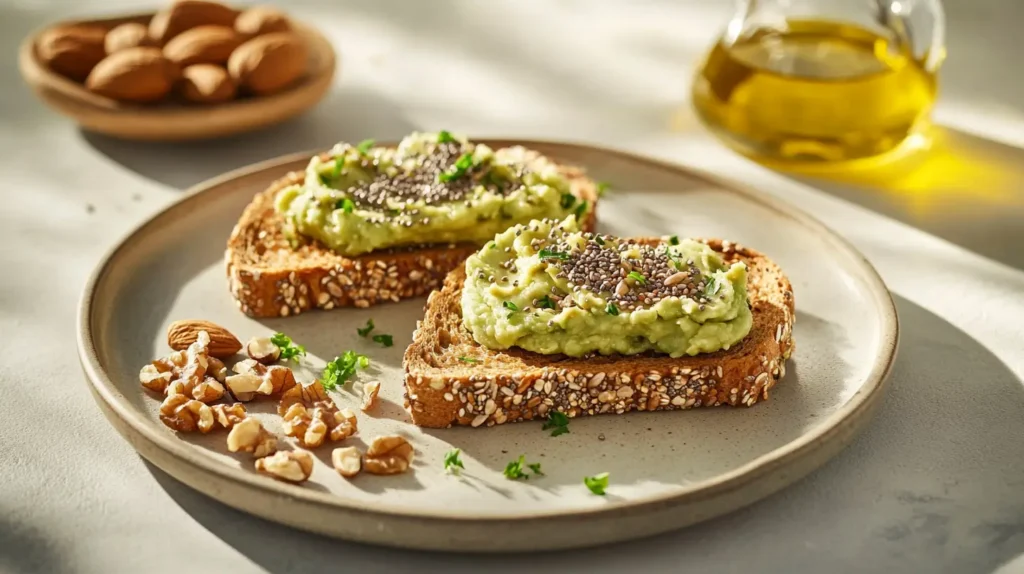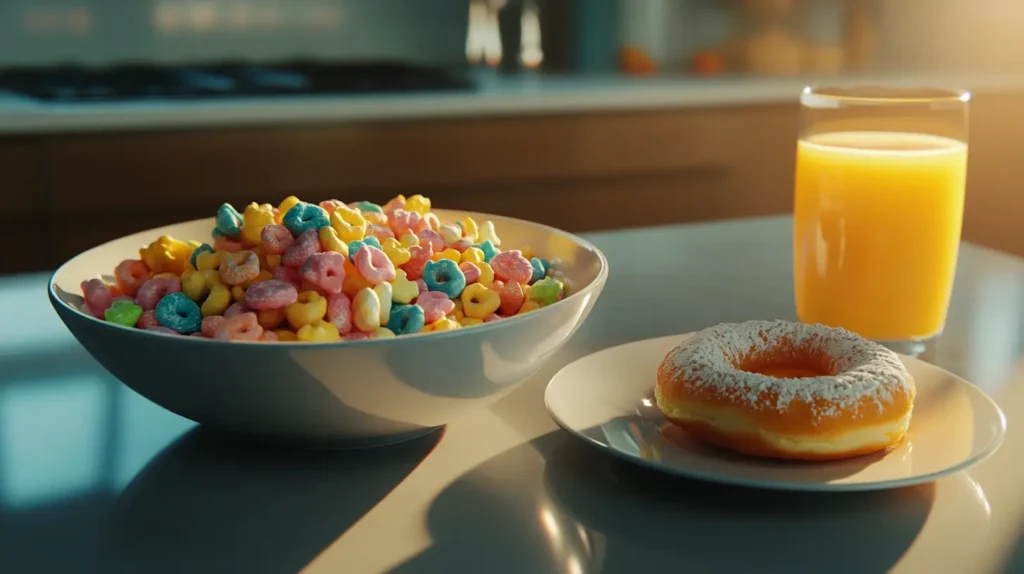Breakfast is often called the most important meal of the day, and for good reason. It provides the body with essential nutrients and energy after an overnight fast, helping to kickstart metabolism, improve cognitive function, and regulate blood sugar levels. Eating a balanced breakfast can enhance concentration, mood, and productivity, making it particularly important for students, professionals, and individuals with demanding daily routines.

Additionally, a nutritious breakfast plays a crucial role in long-term health. Studies have shown that individuals who regularly consume a wholesome morning meal are less likely to suffer from obesity, heart disease, and type 2 diabetes. Skipping breakfast, on the other hand, can lead to increased hunger later in the day, potentially resulting in overeating and poor dietary choices.
By understanding the significance of breakfast and making conscious food choices, individuals can set the tone for a healthier and more energized lifestyle.
Table of Contents
The Components of a Healthy Breakfast
A well-balanced breakfast should include a combination of macronutrients—protein, carbohydrates, and fats—along with fiber, vitamins, and minerals. These components work together to provide sustained energy, support cognitive function, and promote overall health. By selecting nutrient-dense foods, individuals can optimize their breakfast choices for better metabolism, satiety, and well-being.
Protein-Packed Choices for Energy and Satiety
Protein is a crucial component of a healthy breakfast as it helps build and repair tissues, supports muscle health, and keeps you feeling full for longer. Consuming protein-rich foods in the morning can prevent energy crashes and reduce cravings throughout the day. Excellent protein sources for breakfast include:
- Eggs – A complete protein source rich in essential amino acids and vitamins.
- Greek Yogurt – High in protein and probiotics, supporting gut health.
- Cottage Cheese – Packed with casein protein, which provides prolonged satiety.
- Nut Butter – Almond or peanut butter offers protein and healthy fats.
- Lean Meats or Fish – Turkey, chicken, or smoked salmon are great protein-rich options.
- Plant-Based Proteins – Tofu, tempeh, chia seeds, and quinoa serve as excellent vegetarian protein sources.
Healthy Carbohydrates for Sustained Energy
Carbohydrates are the body’s primary energy source, and choosing the right ones can keep blood sugar levels stable while providing lasting energy. Healthy carbohydrate options for breakfast include:
- Whole Grains – Oats, whole wheat bread, brown rice, and quinoa are rich in fiber and complex carbohydrates.
- Fruits – Berries, bananas, apples, and citrus fruits provide natural sugars, fiber, and antioxidants.
- Vegetables – Leafy greens, bell peppers, and tomatoes add vitamins and fiber to breakfast dishes.
- Legumes – Beans and lentils offer slow-digesting carbs along with protein and fiber.
Avoid refined carbohydrates like sugary cereals, white bread, and pastries, as they can lead to blood sugar spikes and energy crashes.
Essential Fats for Brain and Heart Health
Healthy fats are vital for brain function, heart health, and the absorption of fat-soluble vitamins (A, D, E, and K). Including good fats in breakfast can improve cognitive performance and support overall well-being. Some beneficial sources of healthy fats include:

- Avocados – Rich in monounsaturated fats and fiber.
- Nuts and Seeds – Almonds, walnuts, flaxseeds, and chia seeds provide omega-3 fatty acids and protein.
- Olive Oil – A heart-healthy fat that can be drizzled over whole-grain toast or added to smoothies.
- Fatty Fish – Salmon, sardines, and mackerel contain high levels of omega-3s, which support brain health.
- Coconut and Nut-Based Milk Alternatives – A great option for those avoiding dairy.
Fiber for Digestion and Gut Health
Fiber plays a key role in digestion, gut health, and maintaining stable blood sugar levels. It promotes regular bowel movements, supports beneficial gut bacteria, and helps with weight management. High-fiber breakfast options include:
- Whole Grains – Oats, bran cereal, and whole wheat bread offer soluble and insoluble fiber.
- Fruits – Apples, pears, raspberries, and oranges are excellent fiber-rich choices.
- Vegetables – Leafy greens, carrots, and bell peppers add fiber and nutrients to breakfast.
- Legumes – Beans, chickpeas, and lentils provide a good mix of fiber and protein.
- Nuts and Seeds – Flaxseeds, chia seeds, and sunflower seeds are fiber-dense additions to smoothies and yogurt.
Healthy Breakfast Ideas for Different Lifestyles
Breakfast should be tailored to fit individual lifestyles, dietary preferences, and health goals. Whether you have a busy schedule, aim to build muscle, follow a plant-based diet, or need a low-carb option, there are plenty of nutritious breakfast choices available. Here are some ideas for different needs and lifestyles.
Quick and Easy Breakfasts for Busy Mornings
For those with hectic mornings, a nutritious breakfast doesn’t have to be time-consuming. Here are some quick and convenient options:
- Overnight Oats – Combine oats, milk (or a dairy-free alternative), chia seeds, and fruit in a jar the night before for a grab-and-go meal.
- Greek Yogurt Parfait – Layer Greek yogurt with granola, nuts, and berries for a protein-rich, no-cook breakfast.
- Smoothies – Blend bananas, protein powder, spinach, nut butter, and almond milk for a nutrient-packed breakfast in minutes.
- Hard-Boiled Eggs and Whole-Grain Toast – Prepare boiled eggs in advance for an easy protein boost.
- Nut Butter and Banana Wrap – Spread almond or peanut butter on a whole wheat tortilla, add banana slices, and roll it up for a portable breakfast.
High-Protein Breakfasts for Muscle Building
For those focused on muscle growth, a protein-rich breakfast is essential. Here are some high-protein meal ideas:
- Scrambled Eggs with Spinach and Turkey Sausage – A hearty meal packed with protein and iron.
- Cottage Cheese with Nuts and Berries – A great source of casein protein for muscle recovery.
- Protein Pancakes – Blend oats, eggs, protein powder, and banana to make a muscle-friendly pancake stack.
- Tofu Scramble with Avocado and Whole-Grain Toast – A plant-based protein alternative for muscle repair.
- Chicken and Egg Breakfast Wrap – A whole wheat wrap filled with grilled chicken, scrambled eggs, and cheese.
Vegan and Plant-Based Breakfasts
For those following a plant-based diet, it’s important to include protein, healthy fats, and fiber in Healthy Breakfast. Some vegan-friendly options include:
- Chia Seed Pudding – Mix chia seeds with almond milk and let it sit overnight, then top with fresh fruit.
- Tofu Scramble with Veggies – A protein-rich alternative to scrambled eggs.
- Vegan Protein Smoothie – Blend plant-based protein powder with spinach, banana, and almond milk.
- Peanut Butter and Banana Toast – Whole grain toast topped with nut butter and banana slices.
- Oatmeal with Nuts and Flaxseeds – A fiber-rich meal with added plant-based proteins.
Low-Carb and Keto Breakfasts
For individuals following a low-carb or ketogenic diet, breakfasts should be high in healthy fats and protein while minimizing carbohydrate intake. Some great options include:
- Avocado and Egg Bowl – A halved avocado filled with a baked egg.
- Keto Pancakes – Made with almond flour, eggs, and coconut oil for a low-carb alternative.
- Cheese and Spinach Omelet – A filling meal with healthy fats and protein.
- Chia and Flaxseed Pudding – A fiber-rich, keto-friendly alternative to oatmeal.
- Bacon, Eggs, and Avocado – A classic, low-carb breakfast plate.
Kid-Friendly Nutritious Breakfasts
Children need a balanced Healthy Breakfast that is both nutritious and appealing. Here are some fun and healthy ideas:
- Banana and Oat Pancakes – Made with mashed bananas, oats, and eggs for a naturally sweet and nutritious meal.
- Fruit and Yogurt Parfait – A colorful mix of yogurt, berries, and granola.
- Peanut Butter and Apple Slices – A simple, protein-rich snack kids love.
- Homemade Breakfast Muffins – Whole wheat muffins made with bananas, carrots, and nuts.
- Scrambled Eggs with Whole-Grain Toast – A classic, protein-packed meal for growing kids.
Common Breakfast Mistakes to Avoid
Many people unknowingly make Healthy Breakfast mistakes that can impact their energy levels, metabolism, and overall health. From skipping meals to choosing unhealthy options, these mistakes can lead to sluggishness, weight gain, and poor nutrition. Understanding these pitfalls can help you make better choices and ensure your healthy breakfast supports your well-being.

Skipping Breakfast and Its Consequences
One of the most common mistakes is skipping breakfast, which can lead to low energy, poor concentration, and increased hunger later in the day. Many people skip breakfast due to a lack of time or appetite in the morning, but this can disrupt metabolism and lead to overeating unhealthy snacks. A nutritious breakfast helps stabilize blood sugar levels, boost metabolism, and improve cognitive function, making it an essential meal of the day.
High-Sugar and Processed Breakfast Foods
Another major mistake is consuming high-sugar and processed breakfast foods, such as sugary cereals, pastries, and flavored yogurts. These foods cause a rapid spike in blood sugar, leading to an energy crash and increased cravings for unhealthy snacks. Instead, opt for a balanced breakfast that includes whole grains, protein, and healthy fats to keep energy levels stable throughout the day.
Not Enough Protein or Fiber
Many breakfast choices lack enough protein or fiber, which are essential for satiety and digestion. A protein-rich breakfast helps build muscle, regulate hunger hormones, and maintain steady energy levels, while fiber supports gut health and prevents blood sugar spikes. To avoid this mistake, include sources of healthy protein such as eggs, Greek yogurt, or nuts, along with fiber-rich foods like whole grains, fruits, and vegetables.
FAQs About the Healthiest Breakfast
Many people have questions about what makes a healthy breakfast and how it impacts their overall well-being. Below are answers to some of the most common breakfast-related questions to help you make better choices for a nutritious breakfast that supports energy, weight management, and brain function.
What are the worst foods to eat for breakfast?
The worst foods for Healthy Breakfast are those high in sugar, refined carbohydrates, and unhealthy fats. Sugary cereals, pastries, doughnuts, and flavored yogurts can lead to rapid spikes in blood sugar, followed by crashes that leave you feeling sluggish and hungry. A healthy breakfast should prioritize whole foods such as whole grains, protein, and healthy fats to provide sustained energy and better overall nutrition.
Is skipping breakfast bad for weight loss?
Skipping breakfast can sometimes backfire on weight loss efforts. While intermittent fasting can be beneficial for some, avoiding a nutritious breakfast may lead to increased hunger and overeating later in the day. A healthy Healthy Breakfast rich in protein, fiber, and healthy fats can help regulate appetite, maintain stable blood sugar levels, and prevent cravings that lead to unhealthy snacking.
What is the best breakfast for brain function?
A healthy breakfast that supports brain function should include a mix of protein, healthy fats, and complex carbohydrates. Foods rich in omega-3 fatty acids, such as walnuts and flaxseeds, help improve memory and cognitive function. Whole grains like oats provide a steady release of energy, while protein sources like eggs or Greek yogurt support neurotransmitter production, keeping the brain sharp and focused throughout the day.
What is the unhealthiest candy?
Candy is a beloved indulgence enjoyed by people of all ages, but its impact on health cannot be ignored. Many popular candies are high in sugar, calories, unhealthy fats, and artificial additives, contributing to various health risks such as weight gain, tooth decay, and chronic diseases when consumed excessively. Identifying the unhealthiest candies involves understanding their nutritional profiles, ingredients, and the potential effects they have on the body.
Conclusion
Starting your day with a healthy breakfast is one of the best ways to support overall well-being, maintain energy levels, and improve concentration. By choosing a nutritious breakfast rich in protein, fiber, and healthy fats, you can regulate blood sugar, enhance digestion, and reduce unhealthy cravings throughout the day. Avoiding common breakfast mistakes, such as skipping meals or consuming sugary, processed foods, ensures that your balanced breakfast fuels your body effectively.
No matter your lifestyle or dietary preferences, there are countless ways to create a healthy breakfast that fits your needs. Prioritizing wholesome ingredients and mindful eating habits will set the foundation for better health and long-term wellness.
Print
What is the healthiest breakfast?
Description
A healthy breakfast should be nutrient-dense, balanced, and satisfying, providing protein, fiber, healthy fats, and complex carbohydrates to keep you full and energized. Here are some of the best options:
